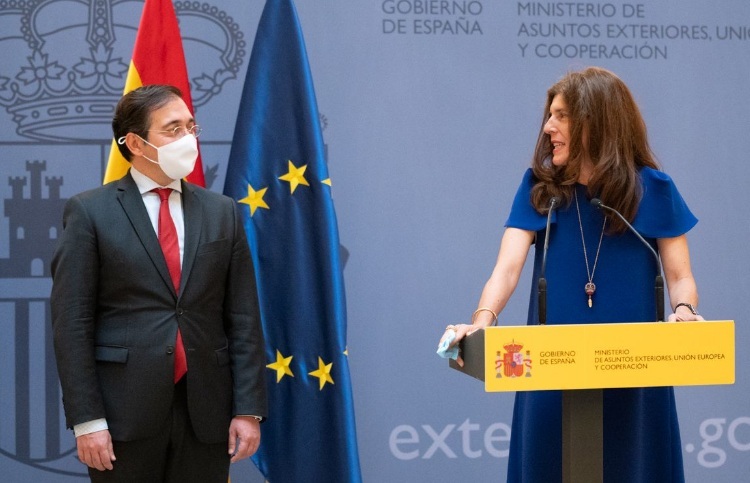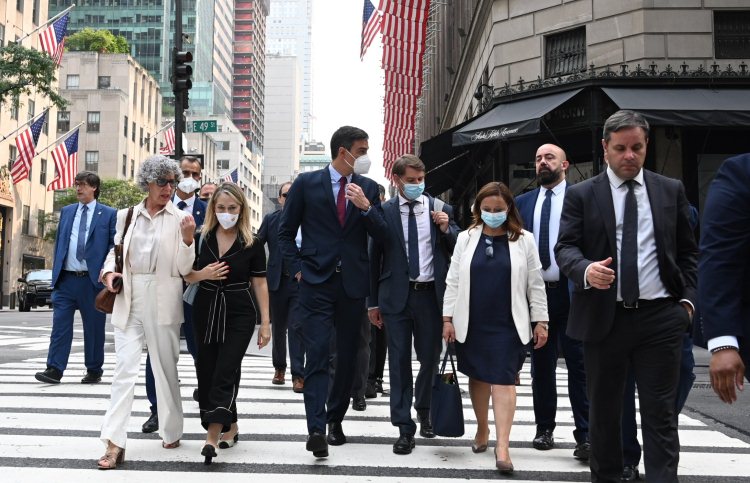Eduardo González
Relations with Morocco, the fight against the pandemic and the role of Spain in Ibero-America were the main topics yesterday, at the Santa Cruz Palace in Madrid, during the inauguration ceremony of the three new Secretaries of State and the five Directors General who will accompany José Manuel Albares in his newly inaugurated term as Minister of Foreign Affairs.
“Our goal must be to put Spain in its rightful place at this time when we have to work for the recovery of the world, of the global village, after the pandemic”, said the new Secretary of State for Foreign and Global Affairs, Ángeles Moreno Bau, after taking the oath of office. “We are the thirteenth largest economy in the world and the fourth largest in the EU, it is a not insignificant place for us to assume our responsibility”, she continued.
According to Moreno, Spain also has the “responsibility” to defend “the European values of freedom, equality, rule of law and sustainability” based on “Agenda 2030, of course, but also NATO 2030”, because “at the summit to be held in April in Madrid, we will have the opportunity to defend with our allies the design of this new strategic approach that will allow our Western model of values to continue to be the model against radical jihadism and other threats”.
Apart from that, she continued, the government must “defend economic and commercial interests so that our companies are successful abroad”, “Foreign policy has always defended the interests of companies, but at a time of recovery like this it is going to be essential and we are going to be with our companies”, maintaining and expanding markets and even “redoubling our presence in the Asian market”.
In order to carry out these objectives, she affirmed, Spain will need “other partners” apart from the Europeans, “particularly the United States”, with whose new Administration it must “walk with in the defense of our political, economic and commercial interests and in the defense of the Spanish language”.
Likewise, Spain will have to work with the “Mediterranean partners”, especially with what is “the most important among our Maghreb partners”, Morocco. “It is our partner and our friend and, in addition, 870,000 Moroccan citizens build Spain every day, they are residents in Spain”, she continued. “Therefore, there are essential interests that we share with them, economic, political and cultural interests, and I have no doubt that we will work and walk with them”, she said.
Fernández Trigo and Cancela
For his part, the new Secretary of State for Ibero-America, the Caribbean and Spanish in the World, Juan Fernández Trigo, congratulated Albares for “recreating a Secretariat of State that is consubstantial for Spain’s foreign policy” and warned that the Government’s foreign action towards that subcontinent is currently facing a “new phenomenon, which is the internalization of our foreign policy with Latin America, which in some aspects makes us try to see problems from very ideological points of view that are not so ideological and do not have solutions in the field of ideology”.
Likewise, he assured that “freedom and liberties are absolutely fundamental in our relationship with Latin America” and reported that during the stage in which he was ambassador in Havana, and while the trip of the President of the Government, Pedro Sánchez, to Cuba (in November 2018) was being prepared, “it was José Manuel Albares (at the time Secretary General of International Affairs in the Presidency of the Government) who spent a whole night giving me instructions so that we managed to create a mechanism for consultations on human rights with the Cubans”.
“I can assure that in the conversations that have taken place in those consultations, human rights have really been talked about, and I believe that thanks to that mechanism we are the country that has been able to talk more concretely and with more exigency about human rights with that country“, continued Fernandez Trigo. “We must defend freedom without slogans, without simplisms, without pre-established categories, and we must defend the interests of Spain with professionalism wherever we go”, he concluded.
Likewise, the new Secretary of State for International Cooperation, Pilar Cancela, informed during her speech that her top priority will be “to continue applying the joint response strategy of Spanish cooperation to COVID and the solidarity vaccination plan approved in January by the Council of Ministers” and assured that Spain is “in a position to make those donations of 22.5 million vaccines announced by the President of the Government to those countries that need them, and especially to the countries of Latin America”. In addition, the “second major priority will be to complete the process of reforming the Spanish Cooperation system” in order to “recover development cooperation once and for all as a policy lever at the service of sustainable development objectives”.
Albares: “There is only one way out of the crisis: vaccination, both inside and outside our borders”
During the closing of the event, José Manuel Albares informed that the objective of his restructuring of the Ministry has been “to adapt it to the foreign policy that Spain needs at this time”, a “changing” moment due to a health crisis that “only has one way out: vaccinate, vaccinate and vaccinate, vaccinate here inside and take the vaccine outside our borders”. “This crisis is a health crisis, it is rapidly transforming into an economic and social crisis and we have to be careful because it can become a geopolitical crisis because not everyone has access to the vaccine”, he added. Therefore, “our task is to vaccinate the people in this foreign service family as soon as possible” and, at the same time, “to take the vaccine abroad, because no one is safe if we are not all safe” and because inequalities in access to vaccines must be prevented from transforming “into a diplomatic crisis”, he added.
Apart from that, “Spain cannot be in the world without a strong presence with our Latin American brothers”, the minister continued, referring to the restructuring of his Department. “There is a lot that we have to do together, especially in these moments of COVID in which Latin America needs our help and is going to have it”, he added.







